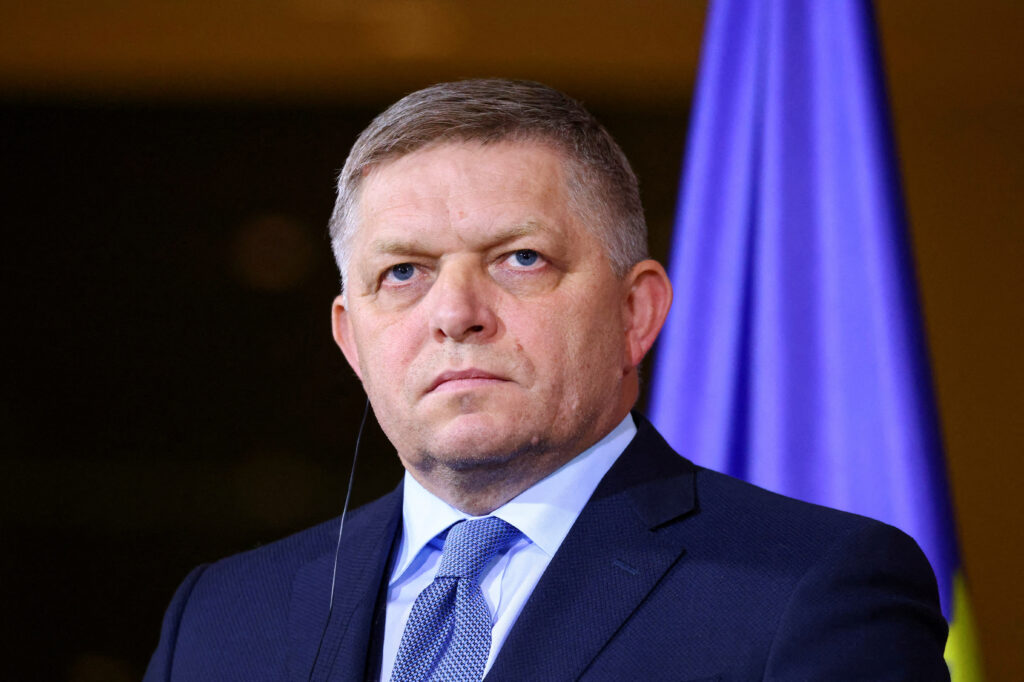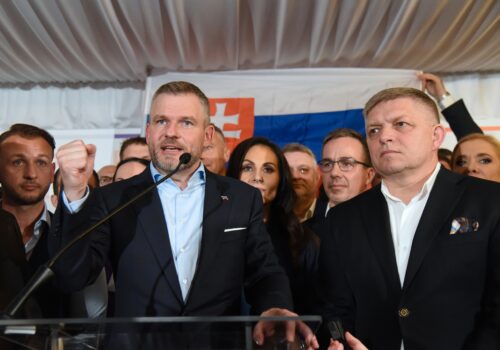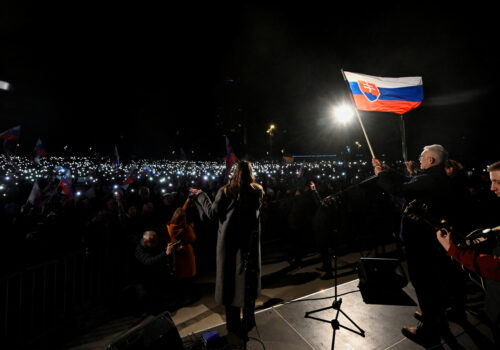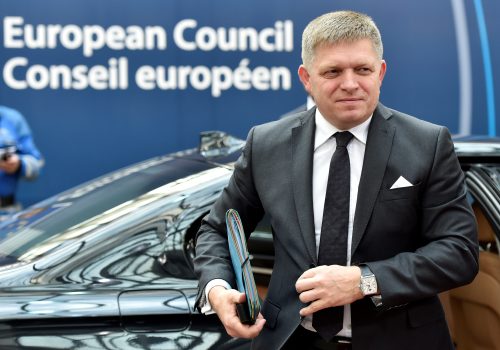On Wednesday, a gunman shot Slovak Prime Minister Robert Fico five times during a public appearance, leaving Fico hospitalized in “very serious” but stable condition. The evidence so far shows that the shooting was politically motivated, according to Slovakia’s interior minister. The populist, Euroskeptic Fico is serving as prime minister for the third time, having returned to the post in October 2023, and Slovakia recently elected a like-minded president to serve alongside him. Below, our experts answered five burning questions about the broader implications of the shooting.
1. What’s most important to know about Fico?
Fico is sometimes compared to Hungarian Prime Minister Viktor Orbán as a nationalist authoritarian politician, but he is less doctrinaire and more willing in practice to cut deals and stop short of confrontations with his European Union (EU) and NATO allies. “His bark is worse than his bite,” as a senior Slovak politician of liberal views (and no fan of Fico) put it to me recently. His bark could be awful (e.g., rhetoric hostile to Ukraine) and many of his initiatives have been questionable. Yet, I have known Fico since 2002 and, while I was in government, worked with him on a number of sensitive issues. We sometimes made handshake deals. He always kept his word.
—Daniel Fried is the Weiser Family distinguished fellow at the Atlantic Council and former US assistant secretary of state for Europe.
Fico is a skilled politician and controversial political figure. He is skilled because he had managed a political comeback from a seemingly impossible position. In 2018, he resigned as prime minister in a bid to rein in a political crisis sparked by the murder of an investigative journalist.
Since then, multiple members of his cabinet and other affiliates have been investigated for (or charged with) serious criminal offenses, including organized crime. Several were prosecuted for corruption.
He is skilled because he has managed to erase Slovaks’ memories of these events with pro-Russian rhetoric, which has appealed to many, with pleas for peace (at the expense of Ukraine’s territorial integrity) and various disinformation campaigns that Slovaks are quite prone to. These tactics have helped him garner new support in addition to his base of disillusioned rural voters.
Since taking the helm last October, his cabinet has been working relentlessly to concentrate power and take control of public media and the judiciary, often in fast-track legislative proceedings.
—Soňa Muzikárová is a political economist focused on Central and Eastern Europe and a nonresident senior fellow at the Atlantic Council’s Europe Center.
2. What’s most important to know about the political context in which this assassination attempt took place?
Slovak politics is polarized and heated, as is the case in a number of European countries and the United States. Slovakia’s liberal opposition has long regarded Fico as authoritarian and tolerant of corruption; he lost power in 2018 after the suspicious murder of a Slovak journalist. While both outgoing Slovak President Zuzana Čaputová and incoming President Peter Pellegrini have condemned the shooting and called for calm, the attempted assassination could inflame Slovak politics.
—Daniel Fried
Slovakia’s politics and society are unprecedentedly polarized, which to some extent is the result of a pervasively uncivil political culture, amplified by social media, as well as citizens’ digital and civic illiteracy. What happened is a testament to the worrisome state of Slovakia’s democracy.
—Soňa Muzikárová
3. Who is in charge if Fico is incapacitated, and what should we watch out for from the Slovak government?
Whoever serves as acting prime minister, the person to watch is Defense Minister Robert Kaliňák, a long-time ally of Fico and a former interior minister. As defense minister, he implemented Fico’s decision to terminate Slovak military donations to Ukraine but did not stand in the way of Slovak military sales or deliveries to Ukraine. Capable and comfortable with the United States (an avid biker, he used to lead motorcycle trips through the American West with Slovak fire and police chiefs), Kaliňák could emerge as a leader in future Slovak governments should Fico’s Smer-SD Party remain in power.
—Daniel Fried
4. Based on what we know so far, what consequences could the shooting have for Slovakia’s politics?
Several members of Fico’s cabinet, including Deputy Prime Minister Tomáš Taraba and the minister of culture, Martina Šimkovičová, were quick to allege that the attack is a result of “the hate politics” spurred “by the opposition.”
Deputy Speaker of the National Council of the Slovak Republic Andrej Danko, in the initial hours after the attack, stated that the governing coalition would take a tougher stance on journalists, although he was not clear on how the media had—directly or indirectly—contributed to the attack.
These are signs that the attack might be weaponized by Fico’s cabinet against the opposition, painting liberals as the villain. The cabinet is likely to use this tragedy to further its political agenda by, for example, curbing media freedom. I expect the incident to help Fico and his affiliates capture more electoral support in the future.
—Soňa Muzikárová
5. Is there any disinformation or misinformation spreading following the shooting?
Even before news of the assassination attempt had broken in the West, Margarita Simonyan, editor-in-chief of Russian state-controlled propaganda outlet RT, had already taken to Telegram to declare that Fico had been targeted for his pro-Russian sympathies. Within hours, tens of thousands of social media users were blaming the violence on some combination of EU and Ukrainian operatives. By early evening Slovak time, the Slovak Police issued a statement on their official Facebook page urging that both media institutions and the general public refrain from using comment systems, in order to stem the tide of dangerous speculation and hate speech.
The disinformation will get worse before it gets better. There has not been an act of violence in Europe of this sort in more than twenty years, and early reporting has linked the alleged assassin to both pro-EU and hardline Russian interests. In less than a month, citizens of twenty-seven EU member states will cast their votes to decide the future of Europe. Whatever the EU elections may have been about before, this is now part of the debate.
—Emerson T. Brooking is a resident senior fellow at the Digital Forensic Research Lab of the Atlantic Council and coauthor of LikeWar: The Weaponization of Social Media.
Further reading
Tue, Apr 16, 2024
Slovakia’s presidential choice reinforces its anti-Western leanings
New Atlanticist By
The victory of a Moscow-friendly populist in Slovakia’s presidential election is a worrisome shift away from Western, democratic norms.
Wed, Apr 3, 2024
Your primer on Slovakia’s presidential election
Eye on Europe's elections By Emma Nix, Patrik Martínek
As Slovakia prepares to select its next president in an election that could determine the country's Euro-Atlantic orientation for the next five years, the Europe Center breaks down the key dynamics at play.
Fri, Dec 23, 2022
Slovakia risks becoming another Hungary-style EU spoiler. How should the West respond?
New Atlanticist By Petr Tůma
The transatlantic community should motivate the opponents of nationalist Robert Fico to get together to prevent a Slovak shift toward Hungary and Russia.
Image: Slovakia's Prime Minister Robert Fico looks on during a press conference with German Chancellor Olaf Scholz in Berlin, Germany, January 24, 2024. REUTERS/Nadja Wohlleben.



